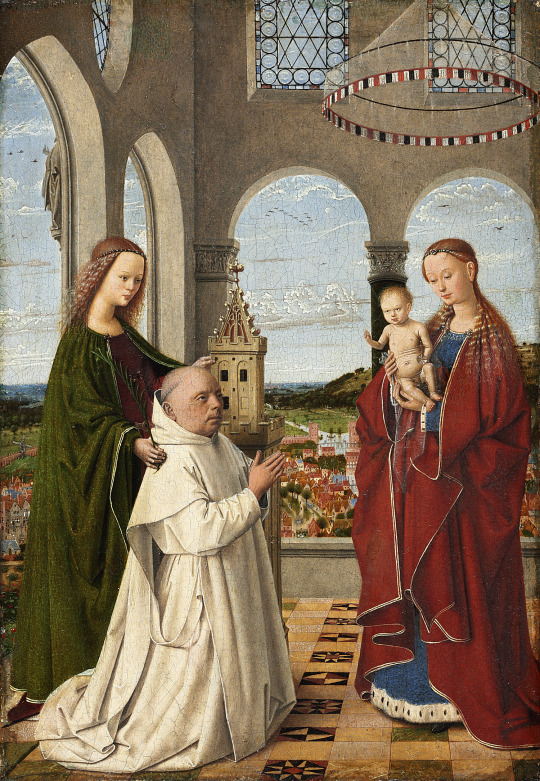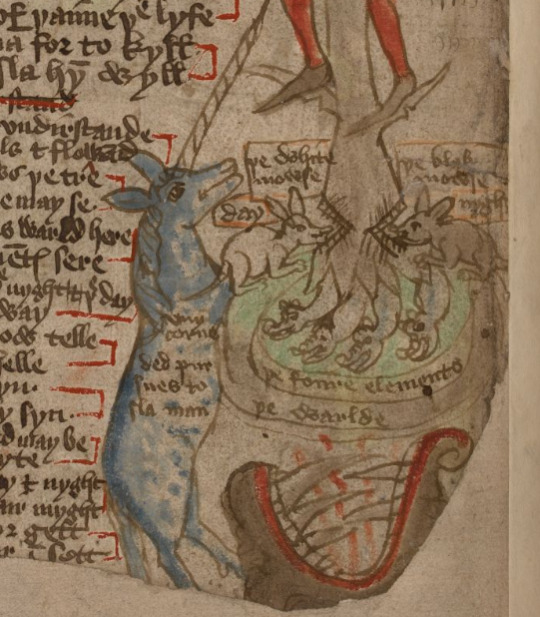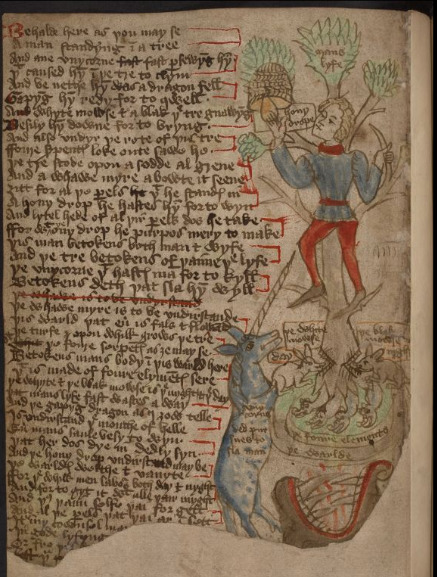#The Carthusians
Explore tagged Tumblr posts
Text

Petrus Christus (Netherlandish, 1410-1475) Portrait of a Carthusian, 1446 The Metropolitan Museum of Art
#Petrus Christus#netherlandish#1446#1400s#art#fine art#european art#classical art#europe#european#fine arts#oil painting#europa#ortrait of a carthusian#christian art#christian#christianity#christentum#catholic#catholic art#catholicism#catholic church#western civilization#portrait#netherlands#belgium#belgian
85 notes
·
View notes
Text

Saint Bruno of Cologne
1030-1101
Feast Day: October 6
Patronage: Germany, Carthusians, Calabria, monastic fraternities, trademarks, help for possessed people
Saint Bruno founded the Carthusians, (by retiring to a hermitage with 6 companions in 1084). They are noted for their strict tradition and the austere rule of St. Benedict’s contemplative life. He was born to a prominent family, taught for 25 years in Reims, was appointed archdiocese Chancellor at 45, and supported Pope Gregory VII and Pope Urban II in the fight against decadent clergy, even helping remove his own scandalous archbishop. He died giving a profession of faith to the Catholic Church’s Sacraments, especially the True Presence.
Prints, plaques & holy cards available for purchase. (website)
35 notes
·
View notes
Text

Summer picture 2 :D Another beauty!
22 notes
·
View notes
Text
'it is likely that the charges against her were thought to be too abhorrent and indelicate to list out in the presence of such a young man' is a line i see a lot in sections on henry fitzroy's absence from the boleyn trial(s), which is like...but it wasn't thought too 'indelicate' to order him to witness her execution?
#i mean i don't think we have record of the 'order' but it is a reasonable assumption#maybe JF & JG thought he volunteered ('he hated her and was going to enjoy watching her die' uh...citation?) but i don't think we have#record of that either and it's unlikely either way...#i doubt he volunteered~ to witness the executions of the carthusians#either...he was likely ordered to be there. along with the other noblemen there.#but he didn't know them. he had known anne#whether he hated or loved or was ambivalent towards her#it would have been extremely strange and macabre to witness the death of his stepmother...#considering his father in law was her uncle; his wife was her confidante; considering that#he seems to have been very amenable to his father's wishes insofar as legitimizing her by his presence at her court#accepting gifts from his father that had the initials and arms of himself and his new wife#his attendance in calais; his marriage to her niece; etc....#and just that he knew her. i don't think he knew her well. but they exchanged gifts and do seem to have been superficially friendly#at the very least...
22 notes
·
View notes
Note
honestly thank you for pointing out that whole "their robes are that color because they're too poor to dye them black" because i would have probably not picked that up just by reading the book once. i was going a little crazy trying to figure out their order from the game alone so when i first started the book i was pretty surprised that they were so clearly benedictine.
do you think they had a reason for not leaning into that in the game? i figured it would've not been hard to put that in some of the dialogue but idk
sorry I don't get the question, are you asking why they didn't learn into being Benedictine in the game? as much as it's a format restraint, I think it's also an 'accessibility' thing, being more palatable to get into and not being too heavy on like. Actual Information
#trying to thinm of other orders they can be and hmmb... i don't think they can be anything wlse#sorry im answering this after just having woken up but. franciscans werent real yet and cistercians weren't in england yet i think..#and the first carthusian monastery wasnt founded until thomas becketts murder. which is at the last part of the book#they never did once allude to what order they are you're right.. i wish they did get into the details of things#any detail they had was put in the inventory section for reading. sighs sadly#birbwellspeaks#pillars of the earth#the pillars of the earth
7 notes
·
View notes
Text
While we await the results of St Mary Magdalene vs. St Dymphna, here's another poll for all of you!
Here are some resources to learn more about each of them:
Religious orders in pictures
Most well known religious orders
A video on religious orders
#cistercians#redemptorists#jesuits#salesians#dominicans#franciscans#missionaries of charity#benedictines#carmelites#carthusians#catholic saint tournament#catholic#catholicism#catholic saints#christianity#polls#theology#tumblr polls
67 notes
·
View notes
Text
Saint of the Day – 8 June – Blessed John Davy O.Cart. (c1490-1535) Deacon, Martyr
Saint of the Day – 8 June – Blessed John Davy O.Cart. (c1490-1535) Deacon of the Carthusian Order, Martyr, Born in York in c1490 and died by being chained to a wall in the Tower prison, London and starved, until his death on 8 June 1535. Also known as – John Davies. Additional Memorial – 4 May as one of the Carthusian Martyrs of London. Blessed John was Beatified on 20 December 1886 by Pope Leo…

View On WordPress
7 notes
·
View notes
Text
[Edward IV] was directly responsible for the introduction into England of the admired continental order of Observant Franciscans. The moving spirit in this venture was probably his sister, Duchess Margaret of Burgundy, who had strong connections with the Order, and who spent much time at Greenwich during her visit to England between July and September 1480: she may well have felt that her brother’s soul stood in need of prayer."
-Charles Ross, "Edward IV" (italics by me)
introducing a new religious continental order to England not because you actually give a fuck about it but because your younger sister pressured you to do it is SO on brand <3
#edward iv#he and EW being granted license to hear services within the Carthusian house at Sheen was almost definitely at EW's instigation as well#since she had gained permission to enter Carthusian houses and hear masses there just 2 years earlier#my post#queue#margaret of york duchess of burgundy
13 notes
·
View notes
Text

Blind children in the courtyard of the Carthusian monastery of Auray, Brittany region of France
French vintage postcard
#postal#courtyard#france#historic#french#ansichtskarte#brittany#sepia#vintage#tarjeta#children#briefkaart#monastery#photo#carthusian#blind#auray#postkaart#ephemera#postcard#postkarte#photography#region#carte postale
4 notes
·
View notes
Photo

Petrus Christus - Madonna and Child with Saint Barbara and Carthusian Monk. 1450
117 notes
·
View notes
Text
“You will find united in this one individual all the patience, courtesy, courage, gentleness and other virtues possible in any mortal man. His presence will annoy nobody, he will not be shunned as a foreigner, rather everyone will treat him as a neighbour, as an old friend or as a brother. He loves the whole human race like himself: his abundant charity cherishes all men.” ~ Adam of Eynsham, praising the Carthusian prior, Hugh of Avalon—later Bishop of Lincoln—to King Henry II of England

2 notes
·
View notes
Text
SAINT OF THE DAY (October 6)

On October 6, the Catholic Church commemorates Saint Bruno of Cologne, founder of the Carthusian order of monks who remain notable for their strictly traditional and austere rule of contemplative life.
Born in 1030, Bruno is said to have belonged to a prominent family in the city of Cologne.
Little is known of his early years, except that he studied theology in the present-day French city of Reims before returning to his native land, where he was most likely ordained a priest in approximately 1055.
Returning to Reims the following year, he soon became head of the school he had attended there, after its director Heriman left to enter consecrated religious life in 1057.
Bruno led and taught at the school for nearly two decades, acquiring an excellent reputation as a philosopher and theologian, until he was named chancellor of the local diocese in 1075.
Bruno's time as chancellor coincided with an uproar in Reims over the behavior of its new bishop Manasses de Gournai.
Suspended by the decision of a local council, the bishop appealed to Rome while attacking and robbing the houses of his opponents.
Bruno left the diocese during this period, though he was considered as a possible successor to Manasses after the bishop's final deposition in 1080.
The chancellor, however, was not interested in leading the Church of Reims.
Bruno and two of his friends had resolved to renounce their worldly goods and positions and enter religious life.
Inspired by a dream to seek guidance from the bishop later canonized as Saint Hugh of Grenoble, Bruno settled in the Chartreuse Mountains in 1084, joined by a small group of scholars looking to become monks.
In 1088, one of Bruno's former students was elected as Pope Urban II.
Six years into his life as an alpine monk, Bruno was called to leave his remote monastery to assist the Pope in his struggle against a rival papal claimant as well as the hostile Holy Roman Emperor Henry IV.
Bruno served as a close adviser to the Pope during a critical period of reform.
Around this time, he also rejected another chance to become a bishop, this time in the Italian region of Calabria.
While he obtained the Pope's permission to return to monastic life, Bruno was required to remain in Italy to help the Pope periodically, rather than returning to his monastery in France.
During the 1090s, Bruno befriended Count Roger of Sicily and Calabria, who granted land to his group of monks and enabled the founding of a major monastery in 1095.
The monks were known, then as now, for their strict practice of asceticism, poverty, and prayer; and for their unique organizational form, combining the solitary life of hermits with the collective life of more conventional monks.
St. Bruno died on 6 October 1101, after making a notable profession of faith which was preserved for posterity.
In this final testimony, he gave particular emphasis to the doctrine of Christ's Eucharistic presence, which had already begun to be questioned in parts of the Western Church.
“I believe,” he attested, “in the sacraments that the Church believes and holds in reverence, and especially that what has been consecrated on the altar is the true Flesh and the true Blood of our Lord Jesus Christ, which we receive for the forgiveness of our sins and in the hope of eternal salvation.”
Veneration of St. Bruno was given formal approval in 1514 and extended throughout the Latin Rite in 1623.
More recently, his Carthusian Order was the subject of the 2006 documentary film “Into Great Silence,” chronicling the life of monks in the Grand Chartreuse monastery.
10 notes
·
View notes
Text

Our flag unicorn means death A unicorn, representing Death, chases a man up the Tree of Life, but the mice of Night and Day are gnawing through the trunk as a dragon's jaws open below...
From a collection of religious stories and travel tales owned at a Carthusian monastery in Lincolnshire and Yorkshire, judging from the northern dialect used. This image illustrates an excerpt from the story of St Barlaam and St Josephat-- which may have been inspired by stories about the young Buddha.

Origin: a Carthusian monastery in Lincolnshire or Yorkshire? Date: c. 1460-1500 Now British Library, Add MS 37049, f. 16v
#unicorn#medieval unicorn#carthusians#buddha#yorkshire history#lincolnshire history#15th century#dragon#mouse#allegory#tree of life
11 notes
·
View notes
Text
re: that last quote, i feel like there is this predominant take that the boleyn downfall was inevitable in one guise or another, always, due to anne's unpopularity specifically, which i feel like underrates...that her unpopularity, as it were (at least, outside of court) seems to have...for lack of a better word...plateaued? by that year.
#im sure it reached a spike in the aftermath of fisher and more's and the carthusians' executions#and yet at the same time her progress with henry that year was considered very successful; and has been so by historians as well#coa had died and so her adherents focused their efforts on promoting the interests of her daughter#and the legitimacy of more questionable marriages had been grudgingly accepted in similar circumstances; historically ; before this#(ie; yes there would always be some that would assert theirs was illegitimate because it took place when coa was alive#but they had what many canonists and lawyers would have considered a common law marriage by that point for years#and coa was no longer. so.#retroactive legitimacy is kind of a thing; again depending on who judges it ; of course#but the reason henry's annulment was not granted in the final judgement#was that he had lived with her for so long as to 'deprive himself of the right to protest against it'#ie lived on the assumption of the soundness of that dispensation for long#and he had been granted a similar dispensation to marry anne (of course; only to be applied in the case of either coa's death or the#annulment of that marriage)#(one that elizabeth would ask for a copy of later...btw)#he had not been living with her as his wife for nearly as long; of course#but diplomacy and the need for allies meant that conceivably some european powers were likely going to be willing to either...#airbrush out those technicalities or ignore them#of course he would not have had an actual marriage ceremony with anne which would've been what the papacy would require ; in 1536#because that would suggest elizabeth's illegitimacy and that he'd been an adulterer for three years and that wasn't his belief#but it is all very...things that make you go hmmm
5 notes
·
View notes
Photo

Carthusian Monks | Chartreuse | Bert Hardy | Getty | WSJ
29 notes
·
View notes
Text
Nostra Signora d Montesenario / Our Lady of the Servites OSM, Monte Senario, Florence, Italy (1240), St Juliana Falconieri OSM and the Saints for 19 June
Nostra Signora d Montesenario / Our Lady of Monte Senario, Florence, Italy – Ordo Servorum Beatae Mariae Virginis (OSM) (1240) – 19 June:HERE:https://anastpaul.com/2021/06/19/nostra-signora-d-montesenario-our-lady-of-monte-senario-florence-italy-1240-and-memorials-of-the-saints-19-june/ St Juliana Falconieri OSM (1270 – 1341) Virgin and Foundress of the Religious Sisters of the Order of…

View On WordPress
4 notes
·
View notes